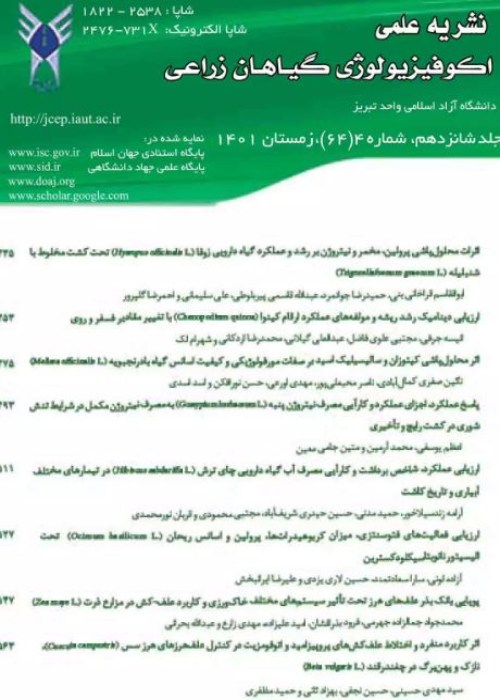The Effect of Stress Modifiers on Nutrient Concentration of Leaf and Grain and Biochemical Characteristics of Quinoa (Chenopodium quinoa Willd.) under Water Deficit Stress
Author(s):
Article Type:
Research/Original Article (دارای رتبه معتبر)
Abstract:
To investigate the effect of water deficit stress and stress modifiers on the nutrient concentration of leaf and grain and biochemical characteristics of quinoa, a pot factorial experiment based on a completely randomized design with 16 treatments and 6 replicates was done in 2019 at Urmia University. The first factor includes water deficit stress at four levels (stress at vegetative growth stage, after plant establishment to flowering; stress at reproductive growth stage, from flowering to flowering end; stress at grain filling stag, from the beginning of filling to maturity; no stress, control) and the second factor is foliar spraying at four levels (ascorbic acid, 2 mM; salicylic acid, 2 mM; nano-micronutrient chelate fertilizer, 2 liters/1000 L water; control, water spray). The results showed that dehydration stress had a significant effect on leaf and grain elements and biochemical traits. Dehydration at different stages of growth reduced chlorophyll a and b, carotenoids and soluble sugars compared to the control but proline content increased. Mean comparison showed dehydration stress in vegetative growth stage, reproductive growth stage and dehydration stress in grain filling stage compared to control (without dehydration stress) increased proline content by 15%, 28% and 31%, respectively. However, dehydration stress at vegetative growth stage, reproductive growth and grain filling stage reduced grain weight by 4, 20 and 20%, respectively, compared to the control (without dehydration stress). Foliar application by increasing proline accumulation and photosynthetic pigment content, increased quinoa grain weight. Foliar application of ascorbic acid, complete micro-nanofertilizer and salicylic acid increased the chlorophyll a content by 2, 13 and 5%, respectively, compared to the control (spraying), respectively. It seems that foliar application of salicylic acid had a more positive effect than other modifiers at different stages of dehydration.
Keywords:
Language:
Persian
Published:
journal of crop ecophysiology, Volume:17 Issue: 66, 2023
Pages:
129 to 146
magiran.com/p2586584
دانلود و مطالعه متن این مقاله با یکی از روشهای زیر امکان پذیر است:
اشتراک شخصی
با عضویت و پرداخت آنلاین حق اشتراک یکساله به مبلغ 1,390,000ريال میتوانید 70 عنوان مطلب دانلود کنید!
اشتراک سازمانی
به کتابخانه دانشگاه یا محل کار خود پیشنهاد کنید تا اشتراک سازمانی این پایگاه را برای دسترسی نامحدود همه کاربران به متن مطالب تهیه نمایند!
توجه!
- حق عضویت دریافتی صرف حمایت از نشریات عضو و نگهداری، تکمیل و توسعه مگیران میشود.
- پرداخت حق اشتراک و دانلود مقالات اجازه بازنشر آن در سایر رسانههای چاپی و دیجیتال را به کاربر نمیدهد.
In order to view content subscription is required
Personal subscription
Subscribe magiran.com for 70 € euros via PayPal and download 70 articles during a year.
Organization subscription
Please contact us to subscribe your university or library for unlimited access!



